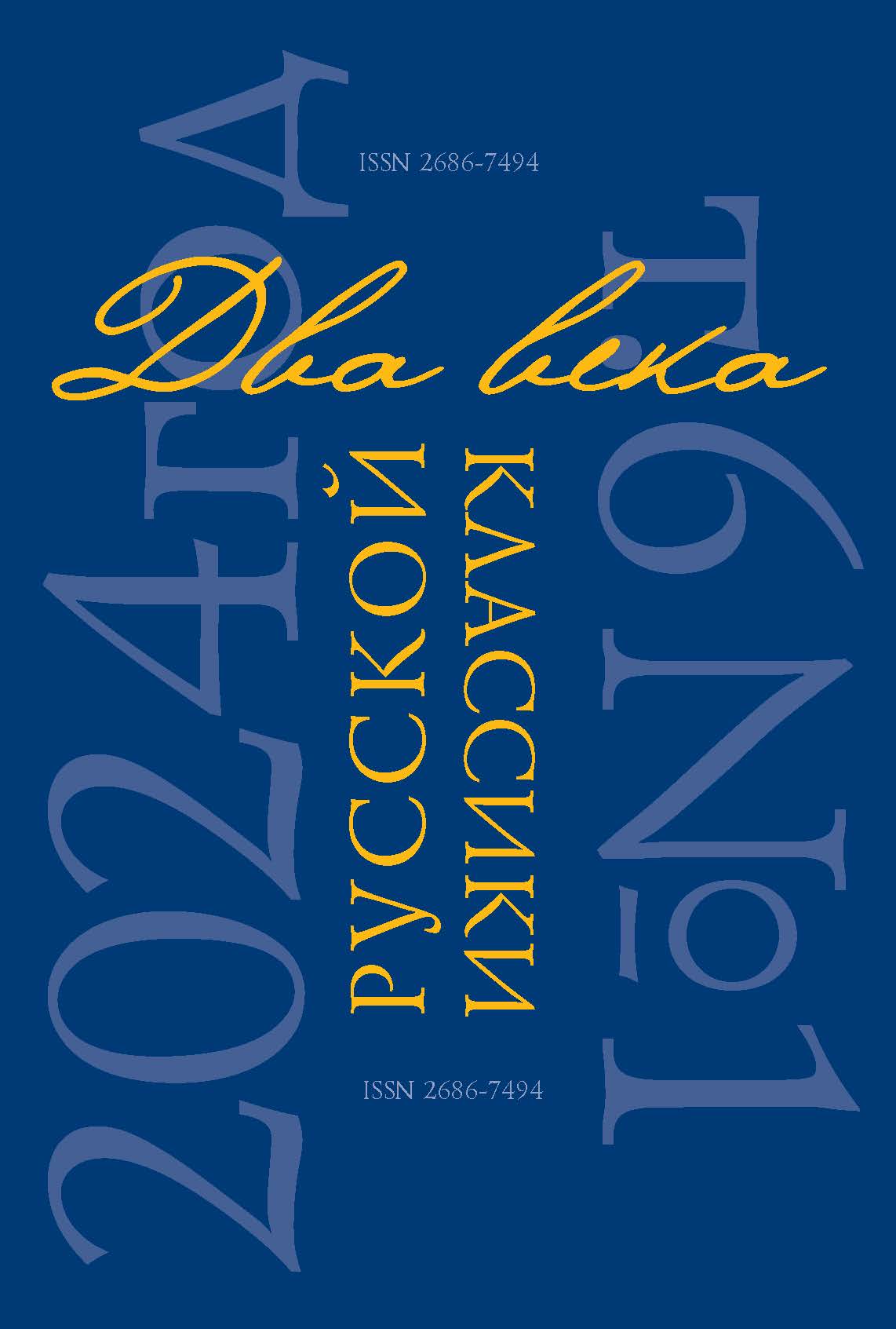Acknowledgments:
The work was carried with financial support of the Russian Science Foundation, project no. 23-28-01302 “Methodology of the Axiological Approach to the Study of Russian Literature by A. A. Ukhtomsky and D. I. Chizhevsky”, https://rscf.ru/project/23-28-01302/
Abstract:
The article proposes a typology of righteous heroes on the material of L. N. Tolstoy’s stories “Father Sergius,” “False Coupon,” “Alyosha the Pot,” and F. M. Dostoevsky’s novels “Teenager,” “The Brothers Karamazov.” The “great sinners” Dostoevsky and Tolstoy have gospel prototypes — the prodigal son and the “prudent thief.” At the same time, both writers have static characters — righteous people carrying Christian ideals. In the later stories of Tolstoy and the novels of Dostoevsky, there is a teleological plot, which includes the plot motifs of the test, the choice of the hero, and his movement toward salvation. Turning to the ethical teaching of A. A. Ukhtomsky, created based on the works of Tolstoy and Dostoevsky, allows us to highlight the dominant character of the hero, which involves the rejection of egocentrism and determines his salvation, as well as the hero’s “doubles” and “interlocutors” who are capable of awakening his selfawareness. A comparison of the reading range of Tolstoy and Dostoevsky shows their attention to the works of John Climacus, Isaac the Syrian, and Tikhon of Zadonsk.
References
Aikhenval’d, Iu. I. Posmertnye sochineniia L. N. Tolstogo s portretom Tolstogo [Posthumous Works of L. N. Tolstoy with a Portrait of Tolstoy]. St. Petersburg, Knigoizdatel’stvo i tipo-litografiia “Energiia” Publ., 1912. 64 p. (In Russ.)
Anninskii, D. V. Graf Lev Nikolaevich Tolstoi, kak moralist [Count Lev Nikolaevich Tolstoy as a Moralist]. Spassk, Sklad izdatelia u avtora Publ., 1914. 150 p. (In Russ.)
Astaf ’ev, P. E. “Nravstvennoe uchenie gr. L. N. Tolstogo i ego kritiki” [“The Moral Teaching of Count L. N. Tolstoy and His Critics”]. Voprosy filosofii i psikhologii, book 4, 1890, pp. 64–93. (In Russ.)
Biblioteka F. M. Dostoevskogo: Opyt rekonstruktsii. Nauchnoe opisanie [F. M. Dostoevsky’s Library: Experience of Reconstruction. Scientific Description]. St. Petersburg, Nauka Publ., 2005. 338 p. (In Russ.)
Bobrov, E. A. Eticheskie vozzreniia grafa L. N. Tolstogo i filosofskaia ikh kritika [Ethical Views of Count L. N. Tolstoy and their Philosophical Criticism]. Yuryev, K. Mattisen Publ., 1897. 100 p. (In Russ.)
Bocharov, S. G. O khudozhestvennykh mirakh: Servantes, Pushkin, Baratynskii, Gogol’, Dostoevskii, Tolstoi, Platonov [About the Artistic Worlds: Cervantes, Pushkin, Baratynsky, Gogol, Dostoevsky, Tolstoy, Platonov]. Moscow, Sovetskaia Rossiia, 1985. 296 p. (In Russ.)
Gusev, A. F. O sushchnosti religiozno-nravstvennogo ucheniia L. N. Tolstogo [On the Essence of the Religious and Moral Teachings of L. N. Tolstoy]. Kazan, Bookstore of A. A. Dubrovin Publ., 1902. 620 p. (In Russ.)
Klimova, S. M. Intelligentsiia v poiskakh identichnosti: Dostoevskii — Tolstoi [Intelligentsia in Search of Identity: Dostoevsky —Tolstoy]. St. Petersburg, Aleteiia Publ., 2018. 246 p. (In Russ.)
Kozlov, A. A. Religiia grafa L. N. Tolstogo, ego uchenie o zhizni i liubvi [The Religion of Count L. N. Tolstoy, His Teaching About Life and Love]. Moscow, LIBROKOM Publ., 2011. 224 p. (In Russ.)
Kocheshkova, L. E. Khudozhestvennaia filosofiia i poetika “maloi” prozy L. N. Tolstogo v svete problemy tselostnosti: Ot povesti “Kazaki” k rasskazu “Alesha Gorshok” [Artistic Philosophy and Poetics of L. N. Tolstoy’s “Small” Prose in the Light of the Problem of Integrity: From the Story “Cossacks” to the Story “Alyosha the Pot”: PhD Thesis, Summary]. St. Petersburg, 2005. 21 p. (In Russ.)
Makovitskii, D. P. “Iasnopolianskie zapiski” [“Yasnaya Polyana Notes”]. Literaturnoe nasledstvo [Literary Heritage], vol. 90: U Tolstogo (1904–1910) [At Tolstoy’s Place (1904–1910)], book 1. Moscow, Nauka Publ., 1979. 544 p. (In Russ.)
Matveeva, I. Iu. “Temy Dostoevskogo v povesti L. Tolstogo ʽFal’shivyi kupon’.” [“Dostoevsky’s Themes in Leo Tolstoy’s Story ʽFalse Coupon’.”] Voprosy literatury, no, 6, 2022, pp. 81–99. (In Russ.)
Nazirov, R. G. “Traditsii Gogolia i Pushkina v russkoi proze XIX veka. Sravnitel’naia istoriia fabul” [“Traditions of Gogol and Pushkin in Russian Prose of the 19th Century. Comparative History of Plots”]. Nazirovskii arkhiv, no. 4(30), 2020, pp. 34–261. (In Russ.)
Plody ucheniia grafa L. N. Tolstogo: kritika religiozno-filosofskogo ucheniia Tolstogo: prilozhenie k zhurnalu “Tserkovnye vedomosti”, izdannym pri Sviateishei Sinode: v 2 kn. [The Fruits of Leo Tolstoy’s Teachings: Criticism of Tolstoy’s Religious and Philosophical Teachings: Supplement to the Journal “Church Bulletin,” Published Under the Holy Synod: in 2 books], book 1. St. Petersburg, Sinodal’naia tipografiia Publ., 1896. 76 p. (In Russ.)
Polnova, K. K. “Nravstvennoe znachenie i esteticheskii smysl narodnykh rasskazov L. N. Tolstogo” [“The Moral Significance and Aesthetic Meaning of Leo Tolstoy’s Folk Stories”]. Istoricheskie, filosofskie, politicheskie i iuridicheskie nauki, kul’turologiia i iskusstvovedenie. Voprosy teorii i praktiki, no. 1 (75), 2017, pp. 168–171. (In Russ.)
Rozenblium, L. “Tolstoi i Dostoevskii: Puti sblizheniia” [“Tolstoy and Dostoevsky: Paths of Rapprochement”]. Voprosy literatury, no. 6, 2006, pp. 169–197. (In Russ.)
Rogover, E. S. “Khudozhestvennoe svoeobrazie povesti L. N. Tolstogo ʽFal’shivyi kupon’.” [“Artistic Uniqueness of Leo Tolstoy’s Story ʽFalse Coupon’.”] Dukhovnoe nasledie L. N. Tolstogo v sovremennykh kul’turnykh diskursakh. Materialy XXXV Mezhdunarodnykh Tolstovskikh chtenii [The Spiritual Heritage of Leo Tolstoy in Modern Cultural Discourses. Materials of the XXXV International Tolstoy Readings]. Tula, Tula State Pedagogical University named after Leo Tolstoy Publ., 2016, pp. 105–116. (In Russ.)
Rodin, K. A. “Tolstoi i Dostoevskii: dva obraza obreteniia Boga” [“Tolstoy and Dostoevsky: Two Images of Finding God”]. Ideas and ideals, vol. 13, no. 4, part 2, 2021, pp. 491–501. (In Russ.)
Saisu, N. “Vospriiatie romana ʽIdiot’ v Iaponii” [“Perception of the Novel ʽThe Idiot’ in Japan”]. Filosofskii polilog, issue 1, 2017, pp. 79–88. (In Russ.)
Skaftymov, A. P. “Obraz Kutuzova i filosofiia istorii v romane L. N. Tolstogo ʽVoina i mir’ (podgotovitel’nye materialy)” [“The Image of Kutuzov and the Philosophy of History in Leo Tolstoy’s Novel ʽWar and Peace’ (Preparatory Materials)”]. Evgenii Aleksandrovchi Maimin i ego vremia. Materialy Mezhdunarodnoi nauchnoi konferentsii [Evgeny Aleksandrovchi Maimin and His Time. Materials of the International Scientific Conference]. Pskov, Pskov State University Publ., 2017, pp. 128–140. (In Russ.)
Skaftymov, A. P. “Tematicheskaia kompozitsiia romana ʽIdiot’.” [“Thematic Composition of the Novel ʽThe Idiot’.”] Poetika khudozhestvennogo proizvedeniia [Poetics of a Work of Art]. Moscow, Vysshaia shkola Publ., 2007, pp. 132–191. (In Russ.)
Sokolova, L. V. A. A. Ukhtomskii i kompleksnaia nauka o cheloveke [A. A. Ukhtomsky and the Complex Science of Man]. St. Petersburg, St. Petersburg University Publ., 2010. 316 p. (In Russ.)
Tarasov, A. B. “Povest’ L. N. Tolstogo ʽFal’shivyi kupon’ — ʽzhitiinaia literatura novogo vremeni’.” [“Leo Tolstoy’s Story ʽFalse Coupon’ as ʽHagiography of Modern Times’.”] Problemy istoricheskoi poetiki, vol. 7. 2005, pp. 409–415. (In Russ.)
Tarasov, A. B. Fenomen pravednichestva v khudozhestvennoi kartine mira L. N. Tolstogo [The Phenomenon of Righteousness in Leo Tolstoy’s Artistic Picture of the World: DSc Thesis, Summary]. Moscow, 2006. 36 p. (In Russ.)
Falenkova, E. V. “ʽStrategiia puti’ strannika kak model’ dukhovnogo razvitiia cheloveka v tvorchestve pozdnego L. N. Tolstogo” [“ʽStrategy of the Path’ of the Wanderer as a Model of Human Spiritual Development in Leo Tolstoy’s Later Works”]. Vestnik Volgogradskogo gosudarstvennogo universiteta, no, 2, 2014, pp. 20–25. (In Russ.)
Fedorova, E. A. “Teleologicheskii siuzhet v romanakh ʽKapitanskaia dochka’ A. S. Pushkina i ʽVoina i mir’ L. N. Tolstogo” [“Teleological Plot in the Novels ʽThe Captain’s Daughter’ by A. S. Pushkin and ʽWar and Peace’ by L. N. Tolstoy”]. Problemy istoricheskoi poetiki, vol. 21, no. 4, 2023, pp. 102–129. https://doi.org/10.15393/j9.art.2023.13123 (In Russ.)
Chertkova, A. K. “L. N. Tolstoi i ego znakomstvo s dukhovno-pravoslavnoi literaturoi” [“Leo Tolstoy and His Acquaintance with Spiritual-Orthodox Literature”]. Golos minuvshego, no. 5, 1913, pp. 219–227. (In Russ.)
Catteau, Jacques. Dostoevsky and the Process of Literary Creation. New York, Cambridge University Press, 1989. 553 p. (In English)
Čyževśkyj, Dmytro. “Literarische Lesefruchte. Teil 3.” Zeitschrift Fur Slavische Philologie, vol. 11, no. 1/2, 1934, pp. 21–34. (In German)
Pattison, George, and Diane Oenning Thompson, editors. Dostoevsky and the Shristian Tradition. Cambridge, Cambridge University Press, 2001. 281 p. (In English)
Jahn, Gary R. “A Note on Miracle Motifs in the Later Works of Lev Tolstoy.” Mandelker, Amy, and Roberta Reeder, editors. The Supernatural in Slavic and Baltic Literature: Essays in Honor of Victor Terras. Columbus, Ohio, Slavica Publ., 1988. 402 p. (In English)
Jones, Malcolm V. “Dostoevskii and Religion.” Leatherbarrow, William J., editor. The Cambridge Companion to Dostoevskii. Cambridge, Cambridge University Press, 2002, pp. 148–174. (In English)
Mclean, Hugh. “Tolstoy and Jesus.” Christianity and the Eastern Slavs, vol. 2: Russian Culture in Modern Times. Berkeley, Los Angeles, University of California Press, 1994, pp. 103–123. (In English)
Müller, Ludolf. “Dostojewskij und Leontjew: Leontjews Aufsatze uber Dostojewskijs Puschkin.” Deutsche Dostojewskij-Gesellschaft, nu. 10, Jahrbuch, 2003, pp. 56–58. (In German)
Terras, Victor. Reading Dostoevsky. Madison, University of Wisconsin Press, 1998. 171 p. (In English)









